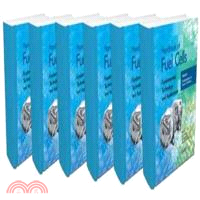Handbook Of Fuel Cells 6Vset
商品資訊
ISBN13:9780470741511
出版社:John Wiley & Sons Inc
作者:Vielstich
出版日:2009/07/29
裝訂/頁數:精裝/1136頁
商品簡介
With internationally renowned editors, advisory board members, and contributors from academia and industry, it guides the reader from the foundations and fundamental principles through to the latest technology and cutting-edge applications, ensuring a logical, consistent approach to the subject.
The Handbook is divided into four main themes:
Volume 1: "Fundamentals and Survey of Systems"
Volume 2: "Fuel Cell Electrocatalysis"
Volumes 3 and 4: "Fuel Cell Technology and Applications"
Volumes 5 and 6: "Advances in Electrocatalysis, Materials, Diagnostics and Durability"
作者簡介
Hubert A. Gasteiger received his Ph.D. in Chemical Engineering from the University of California at Berkeley in 1993, studying the electrocatalysis of methanol oxidation. After 9 years of academic research on fundamental electrocatalysis and heterogeneous gas-phase catalysis, he worked for 10 years in industrial R&D groups. From 1998 to 2007, Dr. Gasteiger was involved in the stack component design for GM/Opel’s H2-powered fuel cell vehicles, leading an R&D group in MEA development and diagnostics at GM/Opel’s Fuel Cell Activities program in Honeoye Falls, New York, where he was promoted to Technical Fellow in 2004. In 2007 he joined Acta S.p.A., Italy, as Director of Catalyst Technology, developing catalysts and electrodes for alkaline (membrane) fuel cells. In January 2009 he took an assignment as Visiting Professor at the Electrochemical Energy Lab in the Dept. of Mechanical Engineering at MIT.
He served as Co‑Editor-In-Chief for Wiley’s Handbook of Fuel Cells – Fundamentals, Technology, and Applications (2003), and published 60 papers in refereed journals and 12 book chapters. In 2004, he received the Klaus-Jürgen Vetter Award for Electrochemical Kinetics from the International Society of Electrochemi
Arnold Lamm has been involved in industrial research in this field for over 7 years, firstly at the DaimlerBenz research centre in Ulm, Germany, where his projects included methanol-reforming, methanolcatalysis, reactor engineering, thermodynamic calculations and system engineering of PEMFC-systems based on methanol. He also worked on the development of a simulation program as a basis for the first methanol-reformer car Necar III. He also worked as Project leader (PEMFC-power station) at the former AEG Energietechnik T&D, Frankfurt, Germany in a project with Ballard Generation Systems. Since 1997 Dr Lamm has been Senior manager for fuel cell systems at the central research of DaimlerChrysler, where his work has included a the demonstration of the worldwide first DMFC-vehicle, development of gasoline/diesel fuel processors for stationary and mobile applications and development of advanced components for FC-propulsion systems (e.g. air-supply). He holds over 40 patents on the fuel cell field.
Harumi Yokokawa
1972 - Graduated from Nuclear Engineering department, University of Tokyo
1977 - Graduated from Doctor course of University of Tokyo
Title of Doctoral work "Calorimetric Investigation of Uranium Compounds"
1977 - Join to National Chemical Laboratory for Industry, Agency for Industrial Science and Technology, Ministry of International Trade and Industry (MITI)
1978–1980 - Research Associated in James Franck Institute, University of Chicago
1982 - Senior researcher, National Chemical Laboratory for Industry
1993 - National Institute of Materials and Chemical Research, AIST, MITI
2001 - National Institute of Advanced Industrial Science and Technology
Awards
1989 - Award by Japan Information Center for Science and Technology on "Construction of Thermodynamic database and its advanced utilization"
2001 - Award by Minister of Science and Technology Agency on "Construction of Thermodynamic database and its applications to energy related materials."
2002 - Outstanding Achievement Awards from the High Temperature Materials Divsion, The Electrochemical Society, Inc., "In recognition of his contributions to the practical applications of thermochemistry to high temperature materials research and technology, especially in the area of solid oxide fuel cells."
目次
Contributors to Volume 1.
Foreword.
Preface.
Abbreviations and Acronyms.
Part 1: Thermodynamics and kinetics of fuel cell reactions.
Part 2: Mass transfer in fuel cells.
Part 3: Heat transfer in fuel cells.
Part 4: Fuel cell principles, systems and applications.
Contents for Volumes 2, 3 and 4.
Subject Index.
VOLUME 2: ELECTROCATALYSIS.
Contributors to Volume 2.
Foreword.
Preface.
Abbreviations and Acronyms.
Part 1: Introduction.
Part 2: Theory of electrocatalysis.
Part 3: Methods in electrocatalysis.
Part 4: The hydrogen oxidation/evolution reaction.
Part 5: The oxygen reduction/evolution reaction.
Part 6: Oxidation of small organic molecules.
Part 7: Other energy conversion related topics.
Contents for Volumes 1, 3 and 4.
Subject Index.
VOLUME 3: FUEL CELL TECHNOLOGY AND APPLICATIONS: PART 1.
Contributors to Volumes 3 and 4.
Foreword.
Preface.
Abbreviations and Acronyms.
Part 1: Sustainable energy supply.
Part 2: Hydrogen storage and hydrogen generation.
Development prospects for hydrogen storage.
Chemical hydrogen storage devices.
Reforming of methanol and fuel processor development.
Fuel processing from hydrocarbons to hydrogen.
Well-to-wheel efficiencies.
Hydrogen safety, codes and standards.
Part 3: Polymer electrolyte membrane fuel cell systems (PEMFC).
Bipolar plate materials and flow field design.
Membrane materials.
Electro-catalysts.
Membrane-electrode-assembly (MEA).
State-of-the-art performance and durability.
VOLUME 4: FUEL CELL TECHNOLOGY AND APPLICATIONS, PART 2.
Contributors to Volume 3 and 4.
Foreword.
Preface.
Abbreviations and Acronyms.
Part 3: Polymer electrolyte membrane fuel cells and systems (PEMFC) (Continued from previous volume).
System design and system-specific aspects.
Air-supply components.
Applications based on PEM-technology.
Part 4: Alkaline fuel cells and systems (AFC).
Part 5: Phosphoric acid fuel cells and systems (PAFC).
Part 6: Direct methanol fuel cells and systems (DMFC).
Part 7: Molten carbonate fuel cells and systems (MCFC).
Part 8: Solid oxide fuel cells and systems (SOFC).
Materials.
Stack and system design.
New concepts.
Part 9: Primary and secondary metal/air cells.
Part 10: Portable fuel cell systems.
Part 11: Current fuel cell propulsion systems.
PEM fuel cell systems for cars/buses.
PEM fuel cell systems for submarines.
AFC fuel cell systems.
Part 12: Electric utility fuel cell systems.
Part 13: Future prospects of fuel cell systems.
Contents for Volumes 1 and 2.
Subject Index.
VOLUMES 5 & 6: ADVANCES IN ELECTROCATALYSIS, MATERIALS, DIAGNOSTICS AND DURABILITY.
Contributors to Volume 5 and 6.
Foreword.
Preface.
Abbreviations and Acronyms.
Part 1: Electrocatalyst Materials For Low Temperature Fuel Cells.
Novel Catalysts.
1. Platinum monolayer oxygen reduction electrocatalysts (R. R. Adzic and F. H. B. Lima).
2. Oxygen reduction on platinum bimetallic alloy catalysts (V. R. Stamenkovic and N. M. Markovic).
3. Dealloyed Pt bimetallic electrocatalysts for oxygen reduction (P. Strasser).
4. Transition metal/polymer catalysts for O2 reduction (C. M. Johnston, P. Piela, and P. Zelenay).
5. Time to move beyond transition metal-N-C catalysts for oxygen reduction (A. Garsuch, A. Bonakdarpour, G. Liu, R. Yang, and J. R. Dahn).
6. Catalysts for the electro-oxidation of small molecules (M. Watanabe and H. Uchida).
7. Influence of size on the electrocatalytic activities of supported metal nanoparticles in fuel cell-related reactions (Frédéric Maillard, Sergey Pronkin, and Elena R. Savinova).
8. Enzyme catalysis in biological fuel cells (Scott Calabrese Barton).
Fundamental Catalysis Models.
9. Density functional theory applied to electrocatalysis (S. Venkatachalam, and T. Jacob).
10. First-principles modeling for the electrooxidation of small molecules (M. Neurock).
11. On the pathways of methanol and ethanol oxidation (W. Vielstich, V. A. Paganin, O. Brandao Alves, and E. G. Ciapina).
12. Reaction pathway analysis and reaction intermediate detection via simultaneous differential electrochemical mass spectrometry (DEMS) and attenuated total reflection fourier transform infrared spectroscopy (ATR-FTIRS) (M. Heinen, Z. Jusys, and R. J. Behm).
13. Methanol oxidation on oxidized Pt surface (H. Varela, E. Sitta, and B. C. Batista).
14. Mechanistic aspects of carbon monoxide oxidation (T. Iwasita and E. G. Ciapina).
Catalyst Durability.
15. Platinum dissolution models and voltage cycling effects: platinum dissolution in polymer electrolyte fuel cell (PEFC) and low-temperature fuel cells (K. Ota and Y. Koizumi).
16. Catalyst and catalyst-support durability (F. T. Wagner, S. G. Yan, and P. T. Yu).
17. Effects of contaminants on catalyst activity (F. H. Garzon and F. A. Uribe).
Part 2: Conductive Membranes For Lowtemperature Fuel Cells.
Novel Materials.
18. Design rules for the improvement of the performance of hydrocarbon-based membranes for proton exchange membrane fuel cells (PEMFC) (M. Gross, G. Maier, T. Fuller, S. MacKinnon and C. Gittleman).
19. High-temperature polybenzimidazole-based membranes (D. C. Seel, B. C. Benicewicz, L. Xiao, and T. J. Schmidt).
20. Radiation-grafted proton conducting membranes (L. Gubler and G. G. Scherer).
21. Alkaline anion-exchange membranes for low-temperature fuel cell application (J. R. Varcoe, S. D. Poynton, and R. C. T. Slade).
Characterization.
22. Colloidal structure of ionomer solutions (G. Gebel).
23. Conductivity, permeability, and ohmic shorting of ionomeric membranes (C. K. Mittelsteadt and H. Liu).
Membrane Durability.
24. Highly durable PFSA membranes (E. Endoh).
25. Factors influencing ionomer degradation (M. Inaba and H. Yamada).
26. Chemical and mechanical membrane degradation (W. K. Liu, S. J. C. Cleghorn, B. E. Delaney, and M. Crum).
27. Mechanical durability characterization and modeling of ionomeric membranes (Y. H. Lai and D. A. Dillard).
Part 3: Materials For High Temperature Fuel Cells.
Fundamental Models.
28. Mechanistic understanding and electrochemical modeling of mixed conducting (SOFC) electrodes (R. Merkle, J. Maier, and J. Fleig).
29. Elementary kinetic modeling of solid oxide fuel cell electrode reactions (S. B. Adler and W. G. Bessler).
30. Mechanical stability (A. Atkinson and A. J. Marquis).
Novel Materials.
31. Factors limiting the low-temperature operation of SOFCs (J. David Carter, T. A. Cruse, B. J. Ingram, and M. Krumpelt).
32. New oxide cathodes and anodes (J. A. Kilner and J. T. S. Irvine).
33. New high-temperature proton conductors for fuel cells and gas separation membranes (R. Haugsrud).
34. Nanoimpact on electrode and electrolyte layers with Micro-Electro-Mechanical System (MEMS) technique (Y. D. Premchand, A. Bieberle-Hütter, H. Galinski, J. L. M. Rupp, T. M. Ryll, B. Scherrer, R. Tölke, Z. Yang, A. Harvey, A. Evans, L. Xu, and L. J. Gauckler).
Materials Durability.
35. Durability of metallic interconnects and protective coatings (M. Mogensen and K. V. Hansen).
36. Impact of impurities and interface reaction on electrochemical activity (M. Mogensen and K. V. Hansen).
37. Application of secondary ion mass spectrometry (SIMS) technique on the durability of solid oxide fuel cell (SOFC) materials (K. Yamaji, N. Sakai, H. Kishimoto, T. Horita, M. E. Brito and H. Yokokawa).
38. Durability of cathodes including Cr poisoning (N. H. Menzler, A. Mai, and D. Stöver).
39. Durable sealing concepts with glass sealants or compression seals (H. P. Buchkremer and R. Conradt).
Part 4: Advanced Diagnostics, Models, & Design.
Low-Temperature Fuel Cells.
40. Direct three-dimensional visualization and morphological analysis of Pt particles supported on carbon by transmission electron microtomography (T. Ito, U. Matsuwaki, Y. Otsuka, G. Katagiri, M. Kato, K. Matsubara, Y. Aoyama, and H. Jinnai).
41. Design approaches for determining local current and membrane resistance in polymer electrolyte fuel cells (PEFCs) (S. A. Freunberger, M. Reum, and F. N. B?uchi).
42. Heat and water transport models for polymer electrolyte fuel cells (U. Pasaogullari).
43. Proton exchange membrane fuel cell (PEMFC) down-the-channel performance model (W. Gu, D. R. Baker, Y. Liu, and H. A. Gasteiger).
44. Use of neutron imaging for proton exchange membrane fuel cell (PEMFC) performance analysis and design (T. A. Trabold, J. P. Owejan, J. J. Gagliardo, D. L. Jacobson, D. S. Hussey, and M. Arif).
45. Local transient techniques in polymer electrolyte fuel cell (PEFC) diagnostics (I. A. Schneider and G. G. Scherer).
46. Proton exchange membrane fuel cell (PEMFC) flow-field design for improved water management (J. S. Allen, S. Y. Son, S. H. Collicott).
47. Performance during start-up of proton exchange membrane (PEM) fuel cells at subfreezing conditions (E. L. Thompson, W. Gu, and H. A. Gasteiger).
48. Performance impact of cationic contaminants (B. S. Pivovar, B. Kienitz, T. Rockward, F. Uribe, and F. Garzon).
49. Modeling the impact of cation contamination in a polymer electrolyte membrane fuel cell (T. A. Greszler, T. E. Moylan, and H. A. Gasteiger).
50. Performance modeling and cell design for high concentration methanol fuel cells (C. E. Shaffer and C. Y. Wang).
51. Design concepts and durability challenges for mini fuel cells (Shimshon Gottesfeld).
High-Temperature Fuel Cells.
52. New diagnostic methods for the polarized state (T. Kawada).
53. Electrochemical impedance spectroscopy as diagnostic tool (S. H. Jensen, J. Hjelm, A. Hagen, and M. Mogensen).
54. Observation and modeling of thermal stresses in cells and cell stacks (H. Yakabe).
Part 5: Performance Degradation.
Low-Temperature Fuel Cells.
55. Carbon-support corrosion mechanisms and models (K. G. Gallagher, R. M. Darling, and T. F. Fuller).
56. Electrode degradation mechanisms studies by current distribution measurements (R. N. Carter, W. Gu, B. Brady, P. T. Yu, K. Subramanian, and H. A. Gasteiger).
57. Electron microscopy to study membrane electrode assembly (MEA) materials and structure degradation (M. Chatenet, L. Guetaz, and F. Maillard).
58. Proton exchange membrane fuel cell degradation: mechanisms and recent progress (T. Madden, M. Perry, L. Protsailo, M. Gummalla, S. Burlatsky, N. Cipollini, S. Motupally, and T. Jarvi).
59. Cold-start durability of membrane-electrode assemblies (C. Y. Wang, X. G. Yang, Y. Tabuchi, and F. Kagami).
60. Field experience with fuel cell vehicles (K. Wipke, S. Sprik, J. Kurtz, and J. Garbak).
61. Membrane and catalyst performance targets for automotive fuel cells (A. Iiyama, K. Shinohara, S. Iguchi, and A. Daimaru).
62. Field experience with portable DMFC products (J. Müller).
High-Temperature Fuel Cells.
63. Overview of solid oxide fuel cell degradation (H. Yokokawa).
64. Methane reforming kinetics, carbon deposition, and redox durability of Ni/8 yttria-stabilized zirconia (YSZ) anodes (E. Ivers-Tiffée, H. Timmermann, A. Leonide, N. H. Menzler, and J. Malzbender).
65. Sulfur poisoning on Ni catalyst and anodes (J. Bǿgild Hansen and J. Rostrup-Nielsen).
66. Ni shorting in relation to acid-base equilibrium of molten carbonate for molten cabonate fuel cell (MCFC) application (S. Mitsushima).
67. Impact of impurities on reliability of materials in solid oxide fuel cell (SOFC) stack/modules (H. Yokokawa, N. Sakai, T. Horita, and K. Yamaji).
68. Field experience with molten carbonate fuel cells (MCFCs) and solid oxide fuel cells (SOFCs) with an emphasis on degradation (H. Frey, A. Kessler, W. Münch, M. Edel and V. Nerlich).
Subject Index.
主題書展
更多書展今日66折
您曾經瀏覽過的商品
購物須知
外文書商品之書封,為出版社提供之樣本。實際出貨商品,以出版社所提供之現有版本為主。部份書籍,因出版社供應狀況特殊,匯率將依實際狀況做調整。
無庫存之商品,在您完成訂單程序之後,將以空運的方式為你下單調貨。為了縮短等待的時間,建議您將外文書與其他商品分開下單,以獲得最快的取貨速度,平均調貨時間為1~2個月。
為了保護您的權益,「三民網路書店」提供會員七日商品鑑賞期(收到商品為起始日)。
若要辦理退貨,請在商品鑑賞期內寄回,且商品必須是全新狀態與完整包裝(商品、附件、發票、隨貨贈品等)否則恕不接受退貨。
























